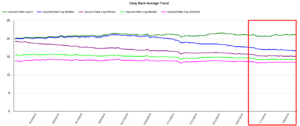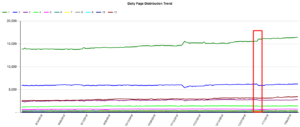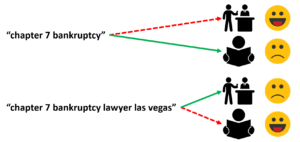SEO Update: What’s New in SEO in February?

Hopefully, your 2019 is off to a great start. Let’s look at what’s new in SEO in February so far. In the first two months of the year, organic search has continued to evolve as we would expect, with several minor updates and just a few larger updates released. We have continued to monitor and track trends in ranking gains and losses. These shifts help us understand what’s truly important to users and search engines.

We’re working hard at developing a more holistic SEO strategy to help customers and their search campaigns succeed well into the future. At the bottom of the blog, you will find a double helping of key articles to keep you informed about the ever-changing search landscape.
Performance
January overall was a fairly slow month in terms of major ranking changes, which should be viewed as good news.

We saw one bigger algorithm change that had an overall positive impact on our client rankings. Looking through several impacted sites, it appears the update tweaked how intent gets viewed through the search engine. Those who were negatively impacted had ambiguous keywords (could be interpreted with several intents). Alternatively, they had keywords clearly not aligned with what the site offered. Several forums and industry blogs reaffirmed that the updates specifically impacted Google’s EAT (Expertise, Authority, and Trust) metric from their Quality Rater Guidelines.
With so much industry chatter around EAT and user intent, I feel it’s a good time to re-cover these topics in detail. I’ll go over the nitty gritty details of how to match searcher intent on a website.
Keywords, Intent and Traffic
We all know the great philosophical question of what came first, the chicken or the egg?

Well, the same existential debate rages around keywords and site creation. I suggest starting the process with some quick keyword research to get a good sense of how people search for a topic or service. Once you have some insight into what people search for when it comes to your particular industry, you can mesh it with your service or product. Begin to refine those keywords with the goals and actions you want potential users to take while visiting your website. Then to finalize the site and get started organically, do a deeper dive into keywords. Use your website as the guide for what keywords potentially fit your general or specific page goals and actions.
Next steps involve searcher intent. It’s important to keep in mind that this portion of SEO will always be subjective and will change from time to time. It’s best to approach this by putting yourself in the searcher’s shoes and make the best assumptions as to what they want to accomplish with a particular search. Take care during this step to mesh your page flow and goals with what searchers may want to do on a page. For example, if you want someone to fill out a lead form on a service page, make sure the potential user intent matches the goal of wanting to get a quote or started with a service.

Increased and Decreased Traffic
Despite all the speculation around user intent, increased or decreased site traffic can validate assumptions as you continue to refine keywords, pages, and content on your site. You can do this by taking a look at current search results to see who currently ranks well. During this validation period, be open to change and continue to refine your keywords, pages, and content.
Measure What Works
Finally, once you start getting traffic to your site, you can begin measuring what works and what doesn’t. Start by giving yourself a few months to get a baseline of traffic and fluctuations. During this time, you should start getting concrete validation that your strategy and keywords work with higher conversion numbers or better site traffic.

Once you have more conversions, you can focus on the pages that don’t seem to be performing as well. Take time to review your user funnel or conversion path and check that it aligns with the flow of traffic through your website. Lastly, always continue growing your website by adding content and pages.
Key Articles to Read
- Gary Illyes Reddit AMA – Google’s Gary Illyes took to Reddit during some downtime to answer a bunch of SEO’s questions around tons of topics. (Source)
- Mobile First Index Update – Google announced on its webmaster blog that over 50% of Google’s current index is mobile-first and continues to grow. (Source)
- Google Penguin Function – A quick poll for CEOs around if they agree that Penguin is dead and no longer an algorithm. This is a good reminder that Penguin is part of the core algorithm now, which runs in real time vs a manual rollout like in 2013. (Source)
- Google’s SEO – A great article from some of the teams that handle Google’s internal SEO. They provided insight into their non-preferential treatment and how they work towards gaining ranks in search pages themselves. (Source)
- January 6th Algo Update? – There was a ton of chatter surrounding an update on January 6th, this update is the one we could see within our data set. This most likely indicates that the update had a significant impact on local-type keywords. (Source)
- Educating Others on SEO – There is a lot of common knowledge here, but also some great ways and tactics to frame the intricacies of SEO for those less aware, great read for CSRs! (Source)
- PageRank Algorithm Explained – The brand ambassador for Majestic explains in fantastic detail how the original PageRank algorithm worked and probably works today. (Source)
Additional Reading
- Links Still Matter – Eric Enge has continued his yearly tradition of measuring the value of links and organic rankings. It is no major surprise that links are still a key factor in achieving top rankings in search. (Source)
- Common eCommerce Mistakes – This is a huge collection of common e-commerce problems when it comes to search. This article also includes great insight from several experts around the challenges of e-commerce. (Source)

